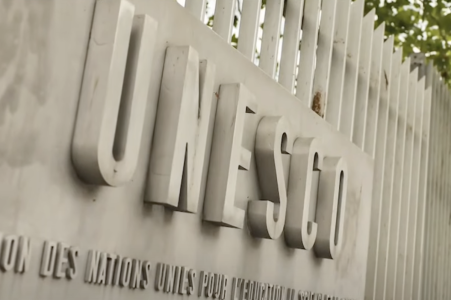What UNESCO does—and what the latest US withdrawal could mean
By
Veronica E.
- Replies 0
UNESCO is often associated with famous landmarks, cultural preservation, and global education initiatives.
Though much of its work happens behind the scenes, the agency plays a key role in designating World Heritage Sites and supporting programs like girls’ education.
With the United States deciding to leave the organization again, many are revisiting questions about UNESCO’s purpose and reach.
This move has sparked renewed interest in how the agency operates and what might change without American involvement.
Here's a look at UNESCO's mission and what the latest US withdrawal could mean moving forward.

UNESCO stands for the United Nations Educational, Scientific and Cultural Organization.
Created after World War II, its mission includes promoting peace and international cooperation through education, science, and culture.
One of its most widely known programs is the designation of World Heritage Sites—landmarks considered to have "outstanding value to humanity."
These include globally recognized places such as the Great Wall of China, the Egyptian pyramids, the Taj Mahal, and the Statue of Liberty.
Sites on the list receive special protections, technical assistance, and professional training to help preserve them, especially when they’re at risk of damage or destruction.
In 2003, UNESCO introduced a related program that protects intangible heritage such as traditional songs, dances, crafts, and recipes—parts of culture that might otherwise fade over time.
UNESCO has also led post-conflict recovery projects.
One recent example is the restoration of historic sites in Mosul, Iraq, which were damaged by the Islamic State group.
Backed by $115 million in funding from international partners, UNESCO helped rebuild the city’s Al-Nouri Mosque and the Al-Hadba Minaret—two landmarks with historical and cultural significance for the region.
UNESCO’s work extends into education and literacy, with a focus on access for girls and students in areas affected by war or natural disasters.
Through efforts like the Malala Fund for Girls’ Right to Education, the agency has helped establish safe spaces and educational opportunities.
In Tanzania, for example, over 2,500 girls benefited from new learning environments in dozens of secondary schools.
UNESCO also supports teacher training and programs encouraging girls to pursue careers in science.
UNESCO manages over 30 programs related to climate change, aiming to improve international education on global warming and support sustainable development.
These initiatives include protecting ecosystems, adapting farming methods, and improving public awareness of environmental shifts.
In 2021, UNESCO introduced a global framework on the ethics of artificial intelligence.
The guidelines, which apply to all 194 member states, encourage transparency, fairness, and the protection of human rights in AI systems.
Given its post-WWII origins, UNESCO has also focused on Holocaust education.
The agency works on raising awareness through the development of educational materials and by organizing visits to former concentration camps.
These programs aim to preserve historical memory and prevent future atrocities.
The United States has had an intermittent relationship with UNESCO in recent decades.
A previous withdrawal occurred under the Trump administration, which cited concerns about anti-Israel bias.
The Biden administration rejoined in 2023, citing interest in reestablishing influence, particularly in areas of policymaking where other global powers were gaining ground.
Now, the US is once again leaving UNESCO.
While past US contributions once made up a large share of the agency’s funding—up to 40% for some United Nations bodies—UNESCO says its financial base has since diversified.
According to UNESCO Director-General Audrey Azoulay, US funding currently makes up about 8% of the total budget.
Azoulay stated that the organization was prepared for the departure.
“Thanks to the efforts made by the organization since 2018, the decreasing trend in the financial contribution of the US has been offset,” she said.
The agency also noted that its overall budget has grown and that it continues to receive support from member states and private contributors.
UNESCO’s work affects many areas of everyday life—from landmark preservation and climate initiatives to education and ethical technology policy.
While the US exit may reduce direct involvement in decisions on these issues, the agency continues its programs with support from its international membership.
Read next: Trump teases the possibility of another political decision–"I'm not done yet."

Have you visited a World Heritage Site or taken part in a cultural tradition you think is worth protecting? What are your thoughts on the role of international organizations like UNESCO in preserving our global history? Share your insights with the community—we’d love to hear your perspective.
Though much of its work happens behind the scenes, the agency plays a key role in designating World Heritage Sites and supporting programs like girls’ education.
With the United States deciding to leave the organization again, many are revisiting questions about UNESCO’s purpose and reach.
This move has sparked renewed interest in how the agency operates and what might change without American involvement.
Here's a look at UNESCO's mission and what the latest US withdrawal could mean moving forward.

UNESCO supports cultural preservation, education, and global cooperation through programs that span across more than 190 member states. Image Source: YouTube / KTLA 5.
A global agency with cultural reach
UNESCO stands for the United Nations Educational, Scientific and Cultural Organization.
Created after World War II, its mission includes promoting peace and international cooperation through education, science, and culture.
One of its most widely known programs is the designation of World Heritage Sites—landmarks considered to have "outstanding value to humanity."
These include globally recognized places such as the Great Wall of China, the Egyptian pyramids, the Taj Mahal, and the Statue of Liberty.
Sites on the list receive special protections, technical assistance, and professional training to help preserve them, especially when they’re at risk of damage or destruction.
In 2003, UNESCO introduced a related program that protects intangible heritage such as traditional songs, dances, crafts, and recipes—parts of culture that might otherwise fade over time.
Also read: Trump withdraws US from the WHO: Here's what you need to know
Rebuilding after destruction: Mosul, Iraq
UNESCO has also led post-conflict recovery projects.
One recent example is the restoration of historic sites in Mosul, Iraq, which were damaged by the Islamic State group.
Backed by $115 million in funding from international partners, UNESCO helped rebuild the city’s Al-Nouri Mosque and the Al-Hadba Minaret—two landmarks with historical and cultural significance for the region.
Also read: The next pandemic could be around the corner: Here’s what the WHO director wants you to know
Education and literacy support
UNESCO’s work extends into education and literacy, with a focus on access for girls and students in areas affected by war or natural disasters.
Through efforts like the Malala Fund for Girls’ Right to Education, the agency has helped establish safe spaces and educational opportunities.
In Tanzania, for example, over 2,500 girls benefited from new learning environments in dozens of secondary schools.
UNESCO also supports teacher training and programs encouraging girls to pursue careers in science.
Also read: Strange height difference at NATO Summit fuels wild Trump conspiracy theories
Programs addressing current challenges
UNESCO manages over 30 programs related to climate change, aiming to improve international education on global warming and support sustainable development.
These initiatives include protecting ecosystems, adapting farming methods, and improving public awareness of environmental shifts.
In 2021, UNESCO introduced a global framework on the ethics of artificial intelligence.
The guidelines, which apply to all 194 member states, encourage transparency, fairness, and the protection of human rights in AI systems.
Also read: Obama responds after President Trump accuses him of "treason" over Russia investigation
Holocaust education and historical awareness
Given its post-WWII origins, UNESCO has also focused on Holocaust education.
The agency works on raising awareness through the development of educational materials and by organizing visits to former concentration camps.
These programs aim to preserve historical memory and prevent future atrocities.
Also read: Could you be suffering from “Trump derangement syndrome”? New bill aims to find out
The US role—and recent decision to exit
The United States has had an intermittent relationship with UNESCO in recent decades.
A previous withdrawal occurred under the Trump administration, which cited concerns about anti-Israel bias.
The Biden administration rejoined in 2023, citing interest in reestablishing influence, particularly in areas of policymaking where other global powers were gaining ground.
Now, the US is once again leaving UNESCO.
While past US contributions once made up a large share of the agency’s funding—up to 40% for some United Nations bodies—UNESCO says its financial base has since diversified.
According to UNESCO Director-General Audrey Azoulay, US funding currently makes up about 8% of the total budget.
Azoulay stated that the organization was prepared for the departure.
“Thanks to the efforts made by the organization since 2018, the decreasing trend in the financial contribution of the US has been offset,” she said.
The agency also noted that its overall budget has grown and that it continues to receive support from member states and private contributors.
UNESCO’s work affects many areas of everyday life—from landmark preservation and climate initiatives to education and ethical technology policy.
While the US exit may reduce direct involvement in decisions on these issues, the agency continues its programs with support from its international membership.
Read next: Trump teases the possibility of another political decision–"I'm not done yet."
Key Takeaways
- UNESCO is a United Nations agency focused on education, science, culture, and the preservation of cultural heritage worldwide.
- Programs include World Heritage Site protection, intangible heritage preservation, Holocaust education, climate adaptation, and AI ethics.
- The US has announced its departure from UNESCO, following previous withdrawals and reentries in recent years.
- UNESCO says it has diversified its funding, with the US now contributing 8% of its budget, down from earlier years when its share was higher.
Have you visited a World Heritage Site or taken part in a cultural tradition you think is worth protecting? What are your thoughts on the role of international organizations like UNESCO in preserving our global history? Share your insights with the community—we’d love to hear your perspective.






